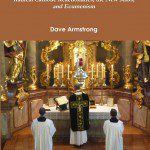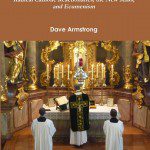[public domain / Pixabay]
***
1) I have much in common with “traditionalists”. I admire several things about them: their zeal and concern for orthodoxy, desire to see liturgical and architectural excellence and propriety and traditionalism, observance of traditional Catholic piety and morality, willingness to take on theological liberals and modernists and dissidents, desire to see people come into the fullness of the Catholic faith and into the Church, detestation of the lack of Catholic influence and decline in vocations and historical signs of Catholic vitality, etc. I am usually in agreement with “traditionalists” and consider myself a close ally to them. We disagree on some things, but this is far less than the agreement and unity that is present. This is supremely important to understand and always keep in mind before anyone proceeds to read this book. I call myself a “Catholic.” If pressed as to what “kind” of Catholic, I say “orthodox” (meaning, literally, “correct belief”). If asked what that means, I say, “I accept all that the Church infallibly teaches and submit wholeheartedly to the magisterium of the One True Church, founded by Our Lord Jesus Christ and historically continuous ever since.” “Traditionalists” would agree with all this, but I don’t share all of their particular concerns or analyses. Nevertheless, I feel quite close to them, and a strong kinship or affinity.
*
2) “Traditionalists” accept the validity of the Novus Ordo or “New” or Pauline Mass (now also referred to as the “ordinary form”), but sometimes consider it objectively inferior to the Tridentine Mass, (extraordinary form) and (as I wholeheartedly agree) often subjected to the grossest abuses in practice. I agree that all abuses ought to be eliminated, but the Church allows and encourages liturgical diversity within a proper observance, so that people can worship as they please, within the context of correct, orthodox liturgical practice. There are 22 rites in the Catholic Church.
*
3) I don’t have the slightest objection to anyone preferring to attend the Tridentine Mass (or, “Traditional Latin Mass” [TLM] or “extraordinary form”). I was completely in favor of Pope Benedict XVI’s 2007 decree (Summorum Pontificum) to make the TLM / EF more widely available (that had been my own position since becoming a Catholic in 1990). I’ve been attending the only parish in metro Detroit that offered it prior to that time, and have attended the very reverent, traditionally practiced Novus Ordo Latin Mass there since 1991 to the time of writing. This book will consider as “radical Catholic reactionaries” those who insist on (among other things) continually bashing the Pauline “New” Mass (whether they regard it as valid or not), as somehow less than fully Catholic, or doctrinally watered-down: along with insults towards those who prefer it, as second-class Catholics.
*
4) “Traditionalists” fully accept the Second Vatican Council as a legitimate ecumenical council, but (to various degrees) they usually contend that it was “ambiguous” and was subject to an attempted takeover by modernists in the Church, or is quite different (so they argue) since it was merely “pastoral”. I reply that controversy and subterfuge existed on a human level in all councils. This is precisely why we need the protection of the Holy Spirit, lest human beings make a complete mess of everything in the Church.
*
5) “Traditionalists” believe that the popes since Pius XII (the usual dividing line in radical Catholic reactionary and sedevacantist analyses) are legitimate popes, though they make many strong criticisms, to various degrees.
*
6) “Traditionalists” accept the notion of the indefectibility of the Church. I have used the term “quasi-defectibility” to describe the far more radical position of holding that the Church is still the Church, but in very dire condition and barely surviving. I’ve always agreed (closely following my mentor, Fr. John A. Hardon, S. J.) that modernism is the greatest crisis in the history of the Church. Disagreement with radical Catholic reactionaries (and “traditionalists” to some extent, depending on the person) occurs regarding its exact cause and location, and the solutions to the problem.
*
7) Many “traditionalists” (and virtually all radical Catholic reactionaries) take a very low view of ecumenism; yet I have often observed that “Catholic ecumenism” is erroneously defined by such critics as heretical indifferentism: something that Vatican II and encyclicals have consistently condemned. The tendency is to think that ecumenism is somehow contradictory to the notion of “no salvation outside the Church” or efforts to do apologetics and to bring people into the fullness of the One True Church (which it is not at all). It’s a confusion of category and intent.
*
8) I continue to consistently put “traditionalist” in quotes because I deny that the self-identified group has a unique or exclusive monopoly on Catholic tradition, or understanding of it that is qualitatively different from that of any orthodox Catholic. With all due respect, it’s an ultimately improper and unnecessary use. Yet I am willing to at least call “traditionalists” what they call themselves, even if I put it in quotes, to register a “protest” of sorts. In doing so, I am following in spirit the use of Pope Benedict XVI, before he was pope, in The Ratzinger Report (San Francisco: Ignatius Press, 1985). He referred to “the so-called ‘traditionalism'” (p. 29). Can you imagine a pope (or future pope) referring to “the so-called ‘Dominicans'” or “the so-called ‘Franciscans'”? Obviously, it is not standard usage of terms. Likewise, Pope Benedict XV wrote in his 1914 encyclical, Ad Beatissimi Apostolorum (section 24):
*
. . . Catholics should abstain from certain appellations which have recently been brought into use to distinguish one group of Catholics from another. . . . Such is the nature of Catholicism that it does not admit of more or less, but must be held as a whole or as a whole rejected: . . . There is no need of adding any qualifying terms to the profession of Catholicism: it is quite enough for each one to proclaim “Christian is my name and Catholic my surname,” . . .
*
9) I define “radical Catholic reactionaries” as a rigorist, divisive group completely separate from mainstream “traditionalism” that continually, vociferously, and vitriolically (as a marked characteristic or defining trait) bashes and trashes popes, Vatican II, the New Mass, and ecumenism (the “big four”): going as far as they can go without technically crossing over the canonical line of schism. In effect, they become their own popes: exercising private judgment in an unsavory fashion, much as (quite ironically) Catholic liberals do, and as Luther and Calvin did when they rebelled against the Church. They can’t live and let live. They must assume a condescending “superior-subordinate” orientation. Blessed John Henry Cardinal Newman scathingly criticized this attitude in his sermon, “Faith and Private Judgment” (c. 1849):
*
Men were told to submit their reason to a living authority. Moreover, whatever an Apostle said, his converts were bound to believe; when they entered the Church, they entered it in order to learn. The Church was their teacher; they did not come to argue, to examine, to pick and choose, but to accept whatever was put before them. . . . if a convert had his own private thoughts of what was said, and only kept them to himself, if he made some secret opposition to the teaching, if he waited for further proof before he believed it, this would be a proof that he did not think the Apostles were sent from God to reveal His will; it would be a proof that he did not in any true sense believe at all. . . . if one part was to be believed, every part was to be believed; it was an absurdity to believe one thing and not another; . . . there was no room for private tastes and fancies, no room for private judgment. . . . In the Apostles’ days the peculiarity of faith was submission to a living authority; this is what made it so distinctive; this is what made it an act of submission at all; this is what destroyed private judgment in matters of religion. If you will not look out for a living authority, and will bargain for private judgment, then say at once that you have not Apostolic faith.
It might be argued that the fundamental problem here is one of self-important attitude: a Pharisaical, relentlessly legalistic, know-it-all, holier-than-thou mentality, and lack of faith in the authority of Holy Mother Church; also an unwillingness or inability to think along with the Mind of the Church. That lies at the root. It’s “spiritual kindergarten.” Often (quite humorously but tragic-comically) it will occur in young people, all of 18 or 20 years-old. Thus, the spiritual immaturity often exhibited may simply be part of the usual, utterly predictable adolescent angst and testosterone-driven deluded cocksure “confidence” in one’s own pseudo-infallibility, and superiority to those unfortunate souls who happened to be born at an earlier date. The hippies in 1967 in San Francisco were gonna change the world with flower power. Likewise, these young elites are gonna transform the Church with their manifest wisdom (so they actually believe). In one of my more colorful descriptions in my first book on this topic (Reflections on Radical Catholic Reactionaries: 2002; revised 2013), I defined the common reactionary mindset as a:
*
. . . scenario of every Tom, Dick, and Harry with a picture of Pope St. Pius X in one hand, and a dog-eared copy of Denzinger in the other, going around judging (nay, trashing) the pope or an ecumenical council, as if they were some sort of expert . . . This is self-importance elevated to the level of the profoundly ridiculous; almost grotesque or surreal. And they are blind to this obvious reality, which makes it all the more frightening. One can do that in Protestantism, as everyone is their own pope, when it comes down to it. But to attempt it in Catholicism is patently and manifestly absurd. (#129)
*
10) On 3 August 2013 I coined (as far as I know) the term “radical Catholic reactionary” to describe the aforementioned group; replacing the former terms of “quasi-schismatics” (my semi-original title) and “radtrad” (coined by others in the mid-90s). In doing so, I am trying to build bridges with mainstream “traditionalists”: since many of them have expressed a pronounced dislike of radtrad; contending that it implies a direct connection or even an equation of sensible, acceptable “traditionalists” with radical, rebellious reactionaries: whom they themselves often describe in more derogatory terms than I do, myself: classifying them as wackos or wingnuts, etc. Therefore, it is time for terminology to reflect the “reality on the ground”; to undermine confusion and hurt feelings, and to foster unity and mutual understanding. I’m trying to play my part in that goal, by revising dozens of my own papers and two books on the topic, to reflect this change of terminology and classification. If two words describe the same thing, yet the first is widely misunderstood and causes acrimony to occur, and the second does not do so, then clearly our choice in charity must be the second term (even if the first has objectively significant justification on other grounds).
*
11) People often ask: “why have labels at all? Why do you feel a need to put people in a box and insult them?” Labels (and accurate definitions) are altogether necessary in apologetics, so that groups being critiqued can be properly identified. There is no way to completely avoid it: even if one would like to. Ideally (see #8 above) there should be no need to use even the relatively harmless term “traditionalist”; but the reality of the situation is that there is a sizeable number of Catholics who identify themselves in that way. If enough people do so, then it becomes a matter of common linguistic usage, and the rudimentary courtesy of calling people by their own preferred term. We have to know what we’re talking about. People have names; groups have names. The real trouble comes when those whom I now call radical Catholic reactionaries come around and call themselves “traditionalists” too. Since there are huge differences between them and true “traditionalists” they must be known (in order to have rational discussion) by another name, and this is also charitable towards the legitimate “traditionalists” — whose name is being “cop-opted” by the radicals. The bottom line for apologists is that we have to warn about and refute error, so that those who might be swayed by the error can both avoid and and understand why it is to be avoided, for their own soul’s sake. This requires a descriptive label, to accurately identify the error. The name may not be liked by the ones in error, but it is a lot milder than what they say about the Church and orthodox Catholics who defend her (see #13), but who don’t self-identify as “traditionalists.”
*
12) Attempted discussions with reactionaries always seem to center upon legalistic lines and criteria (valid vs. invalid, schismatic or not, extreme historical cases made normative, canonical minutiae, etc.). In my opinion one must go far underneath or beyond those ploys, to identify the faulty arrogant and “private judgment” attitude that is the premise upon which the legalistic games and tactics are built. Historically, schism was regarded not as heresy per se, but rather, as a lack of love towards fellow Catholics. Quasi-schism partakes of that same quality as a sort of “half-sister,” since it is far down the spectrum towards canonical, or legalistic schism. Technically, most reactionaries are not formally affiliated with schismatic breakaway groups, and sedevacantism (the position that there is no sitting pope) is a tiny, radical wing of the already “extreme” movement. Yet, these are people perhaps or potentially on the way out of the Church, who may very well eventually adopt schismatic positions or even sedevacantism. Those of us who have followed and critiqued the goings-on of the larger movement have personally observed many people head down this road, right out of the Church. Some of them I myself personally and repeatedly warned, to no avail. People “move” in their spiritual lives and are often not today what they were two or five years ago. We can move in the right direction (by God’s grace) or go our own stubborn, rebellious way and take the wrong direction. In this book and in my apologetics work generally, I am trying to prevent folks from going down the wrong path, and to help them understand and explain why the right, “narrow” path is what it is, so others can also take it.
*
13) As for “neo-Catholic” (it is claimed that this term was first used in a radical Catholic reactionary book in 2002): if someone foolishly insists on using the title, then it must be (logically speaking) because it is being used to distinguish oneself from the likes of “[orthodox] Catholics” like me, who have supposedly transmogrified into somehow becoming simultaneously “liberal” and “orthodox” (by the application of this truly silly and nonsensical term). One is either a Catholic or not. A truly “new” (“neo”) Catholic (as if the term and concept can be redefined, willy-nilly) is a dissident or liberal “Catholic”: a new kind of Catholic. But this is an oxymoron, according to the nature of Catholicism.
*
There can be no “new Catholic.” One is simply an orthodox Catholic, according to the tradition of the ages, or not. Catholic (in its deepest sense) means “orthodox”, so to say that one is a “new Catholic” is to say that one espouses a “new kind of orthodoxy,” which, of course, is a self-contradiction. There is no such thing as a “new orthodoxy.” That would be, rather, a novelty or heterodoxy or heresy. Thus the label basically reduces (but this is actually consistently applying logic, mind you) to calling someone heterodox or a heretic. It’s difficult to find any non-derogatory criterion by which “neo-Catholic” can be correctly, non-slanderously applied.
*
It’s a cynical, uncharitable attempt to create division in the Church and separate Catholic believers into a superior-subordinate relationship, with the reactionaries being the ones who “get it” and the “neo-Catholics” being dupes and fellow travelers of their liberal overlords in the lower hierarchies of the Church. Either way, it stinks to high heaven. The reactionary in turn regards the “mainstream traditionalist” as “Traditionalist Lite” or a “half-baked traditionalist” who gets some things but ultimately falls short of profound and sublime reactionary elitist wisdom. For the mostly reactionary folks who sling around this term, “neo-Catholics” don’t simply sincerely misunderstand the nature and causes of the current crisis in the Church, but are, in fact, the very crisis itself. They exemplify it, and are the forerunners and sustainers of it. I and most credentialed Catholic apologists I know of, treat radical Catholic reactionaries as fellow Catholics (hence, “Catholic” right in the middle of this new term).
*
Yet they call us “neo-Catholics.” Sometimes “Novus Ordo Catholic” or “Vatican II Catholic” or “conciliar Catholic” are used. We’re given arbitrary titles that are downright insulting: that question our very orthodoxy or commitment to the fullness of Catholic tradition. Reactionaries are all about taking things to an extreme and digressing into an absurd, almost self-caricatured legalism (including grotesquely exaggerated distortions of the opinions of those who oppose them). “Neo-conservative [Catholic]” is almost equally objectionable as well (especially once one studies about what it means in various reactionary circles). It’s usually used as simply an alternative version of “neo-Catholic”: with pretty much the same inaccurate, logically absurd, and derisive intent. Because “neo-conservatives” are those (in political categories) who used to be liberal, reactionaries simply assume that the “neo-Catholic” is a theological liberal under the pretentious, dishonest guise of being orthodox.
*
The “neo-Catholic” (so they tell us) is at heart a liberal: at best a relative ignoramus as to traditional doctrine and practice and at worst a useful idiot or fellow traveler or a sort of infiltrating spy, in an ecclesiological sense. Needless to say by now, this terminological usage is as intellectually ludicrous and indefensible as it is personally insulting. Those who accept all the dogmas and doctrines that the Catholic Church teaches are Catholics: period!
*
14) “Traditionalists” are a sub-group of the larger category of orthodox Catholics, characterized by particular and distinctive concerns and preferences (most often having to do with authentic Catholic liturgical tradition). No one should have any problem with that (though some issues within their purview of “concern” continue to be debated). Radical Catholic reactionaries, on the other hand, are a completely different group, which is very seriously in error; on a dangerous slippery slope that may lead to schism and/or heresy, and need to be refuted and warned about. That is the purpose of this book.













